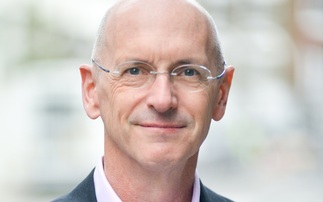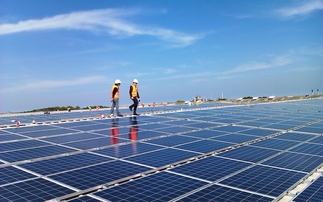"This deal is good for the planet, good for sustainable development and good for business"
Business groups have united this afternoon to call on Ministers to adopt the draft text of the Paris Agreement, arguing it represents a deal that will be good for business and good for the world as a whole.
Speaking following the release of the text, Nigel Topping of the We Mean Business coalition of green business groups said the global economy was now "on the cusp of an historic turning point" that could see it deliver on the promise of keeping temperature increases below 1.5C.
"This deal is good for the planet, good for sustainable development and good for business," he said, adding it would "take the billions [being invested in green infrastructure] and unlock the trillions".
His comments were echoed by Edward Cameron of BSR, who said the deal could provide a "catalytic signal" to businesses and investors that the era of high carbon growth was over and a transition to a low carbon economy is well under way.
He added that seven of the eight asks the green business community had going into the talks featured in the text.
However, observers were united in noting that the deal had not yet been finalised and speculation is now mounting as to whether the French Presidency will seek to push through the adoption of the agreement this afternoon or whether late objections will see the talks run into the evening.
Country delegations are currently undertaking a close analysis of the text, ahead of a 3:45 meeting where it will become clear if some countries are willing to oppose the agreement.
The new text confirms that countries will have to compromise on a raft of issues.
For example, the reference to a 1.5C temperature goal that had been opposed by some nations has been included. However, the reference to greenhouse gas "neutrality" in the second half of the decade has been redrafted to focus on delivering a peak in emissions "as soon as possible" and a "balance between anthropogenic emissions by sources and removals by sinks of greenhouse gases in the second half of this century, on the basis of equity, and in the context of sustainable development and efforts to eradicate poverty".
Compromises on differentiation, climate finance, and emissions measurement, reporting and verification also appear to have been brokered, but it remains to be seen if they will be adopted.
Similarly, the language inviting countries to report on their progress against their national climate action plans every five years has been strengthened slightly so that nations are now "urged" to submit a new plan by 2020 and every five years thereafter.
Topping said the commitment to a five year review before 2020 was an important development that could have a big impact on global emissions.
He said the voluntary process of nations putting forward action plans has already moved the temperature increase trajectory from around 4C to 2.7C and the prospect of updated INDCs within five years could move the trajectory to 1.9C.
The text also specifically highlights the importance of the business community in tackling climate change. It says nations will "uphold and promote regional and international cooperation in order to mobilize stronger and more ambitious climate action by all Parties and non-Party stakeholders, including civil society, the private sector, financial institutions, cities and other subnational authorities, local communities and indigenous peoples".
Jonathan Grant of PwC said it was encouraging a specific reference to emissions trading had made it into the text, although he noted the agreement still had to be adopted. The text currently "recognises the important role of providing incentives for emission reduction activities, including tools such as domestic policies and carbon pricing".
Green groups and think tanks have broadly welcomed the agreement predicting it will provide the investment signals needed to bring the fossil fuel era to an end.
"Paris means Governments will go further and faster to tackle climate change than ever before," said Nick Mabey of E3G. "The transition to a low carbon economy is now unstoppable, ensuring the end of the fossil fuel age."
May Boeve of campaign group 350.org said: "This marks the end of the era of fossil fuels. There is no way to meet the targets laid out in this agreement without keeping coal, oil and gas in the ground. The text should send a clear signal to fossil fuel investors: divest now."
However, one source warned the big test of the agreement would come in how countries deliver on it's the commitments made in the text. "There is a lot of fudge in the deal," they said. "The key is the action on the national level, but this deal will provide a big boost to that action."
This article is part of BusinessGreen's Road to Paris hub, hosted in association with PwC.







